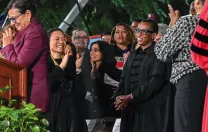The panel discussions accompanying Harvard’s presidential installations provide a good outline of each new administration’s chief academic interests, and so it was on Friday morning, September 29. Four and a half of the six sessions align directly with subjects Claudine Gay has broached as challenges in American society and beyond where University scholarship and teaching can make a difference: addressing inequality (a field in which she launched a Faculty of Arts and Sciences initiative as dean of social science); climate change; biomedical and life sciences; revitalizing democracy; and harnessing generative artificial intelligence as a constructive force in the workplace. That AI symposium also covered teaching and learning—and so could be counted half as oriented to Harvard itself: the venue for the anticipated discoveries and education. The other session, on the future of the academy, put the University’s role squarely at the center of the day’s brainstorming.
Panelists ranged from Crimson superstars—University Professors Danielle Allen, Robert Sampson, and Arlene Sharpe—to exciting younger faculty members. Discussing inequality, assistant professor of education Peter Blair advocated thinking about “who is not in the room” and the perverse employment effects of “degree discrimination.” Hintze professor of business administration Karim Lakhani, who leads his school’s use and analysis of AI, urged people to become acquainted with the tools before rushing to judge them: “You have to be working with it to know its limitations and advantages.” Assistant professor of stem cell and regenerative biology Kara McKinley spoke about tissue regeneration. Studying the uterus and the cycles of damage from menstruation, she said, may inform understanding of scarring and healing disorders: “Our goal is to help our bodies heal better.”
In the end, Matthew Ichihashi Potts, Plummer professor of Christian morals and Pusey Minister in the Memorial Church, reminded hearers, no matter the subject, of the University’s foundational commitment to educating the whole person, observing that “there are moral demands upon us as we face our future”—perhaps now more than ever.
A full account of the symposiums appears at harvardmag.com/install-academy-23.









